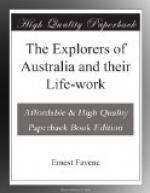On the 17th two more horses died from the effects of the poison plant. Fifteen only were left out of the forty-two with which they had started. They were now approaching the narrow point of the Cape, and found themselves on a dreary waste of barren country whereon only heath grew, and which was intersected with boggy creeks.
On the 10th of January, they caught a glimpse of the sea from the top of a tree, and on the 20th they were in full view of it. As they went on, they were entangled in the same kind of scrub that baffled Kennedy, and at last on the 29th, after some days of scrub-cutting, it was determined to halt the cattle, whilst the brothers should push on to Somerset in the endeavour to find a more practicable track. In the tangled, scrubby country through which they had passed, it had been difficult to form a true conception of the distance, and their estimate of twenty miles for the distance separating them from the settlement was much too short.
On the 30th of January, the two Jardines and their most trusted black boy, Eulah, started to find the settlement. For a time they were hemmed in by a bend of what they took to be the Escape River, but on getting clear of it, they were surprised to come to another large and swollen river, which apparently ran into the Gulf. This forced them to return. After a few days’ rest, they made a second vain attempt. Hemmed in by impassable morasses and impenetrable thickets, in some places they were cut off from approaching even the river, by formidable belts of mangroves. In fact, the Jardine River, as it is now called, heads almost from the eastern shore, from Pudding Pan Hill in fact, Kennedy’s fatal camp. It overlaps the Escape River, and after many devious windings and twistings, flows across the Cape out on to the Gulf shore.
It was not until the end of February that, on the subsidence of some of the flooded creeks, the brothers made a successful effort, and got into somewhat better travelling country. The next morning they came across some blacks who were eager to be on good terms, and hailed them to their surprise with shouts of “Franco; Allico; Tumbacco”. These cries had been taught them by Mr. Jardine, who was getting anxious because of his sons’ delay, and had done all he could think of to help them. He had cut a marked tree line, almost from sea to sea; and coached the local natives up in a few English words, so as to be recognised as friends. This last device succeeded admirably. From these newcomers, they selected three as guides, and the following day reached the settlement.
The rest of the party and the stock were soon brought into Somerset, where a cattle-station was formed. When we look back at the difficulties that beset the path of this expedition, and the unforseen disasters that befel them, one cannot help feeling the greatest admiration for the leaders and their conduct. In spite of the numberless treacherous attacks of the blacks to which they had been subjected, not a member of the band had been lost. They had fought their way through the same species of danger that had environed the unfortunate Kennedy, and had all lived to tell the tale. The Royal Geographical Society rewarded the labours of the two brothers by electing them Fellows of the Society, and by awarding them the Murchison medal.




